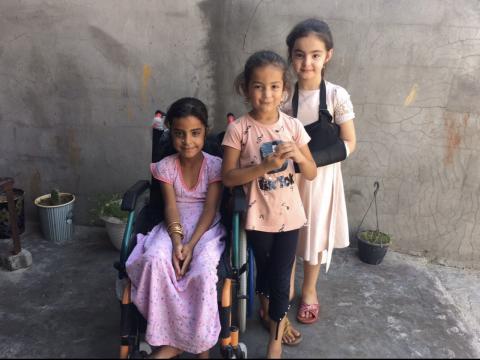Tabarak

Her name is Tabarak. In Arabic her name means magnified. She comes from a town in northeastern Iraq. When she was born eight years ago, everything looked normal. She was the second child, with an older brother and younger twin brothers.
When she turned a year old, a neighbour brought to her mother, Namo’s attention that there may be something different about Tabarak. She was a year old and still could not walk. Her mother worried and tried to stand Tabarak on her feet, but she would fall down. She started checking her and found two protruding bones in her upper legs. She realised then that her daughter had a disability. Namo asked her husband to arrange an operation for their daughter, but he said they could not afford the operation. A few years later, Tabarak’s father abandoned their family, because he could not stand caring for Tabarak. He told Namo, "Leave her somewhere and see if someone will pick her up." Namo never left her daughter.
In 2014, when the conflict errupted in Iraq, Namo’s brother advised her to run away to Tooz and stay there. Displaced in Tooz, Namo and her children stayed at her parents’ house for five years. When her mother passed away and her father remarried, her step-mother forced them to leave the house. They were homeless for a period of time, before someone in the community offered them a house with two rooms and a yard. They have been living there ever since.
When Tabarak was three years old, her great-aunt passed away. Before she passed away, she wished that all her gold be given to Tabarak. With some other money given to them, they were able to pay for her operation. Despite the operation, Tabarak is still unable to walk, but at least her pain is lessened.
As a single mother, although she was occasionally able to provide beauty services for other women from her home, Namo and her children were dependent on others.
As Tabarak’s reached kindergarten age, her mother registered her and carried her to kindergarten every day. When she reached school age, Tabarak insisted that she must go to school and she was carried to-and-from the school every day for two years.
Today the bond between Tabarak and her mother is very strong. Namo does everything to help Tabarak live a normal life. Namo shares, “Tabarak tells me thank you so much. ‘You are my dad and my mom’ (she says), and she always kisses my hands.”
At the age of eight, Tabarak enjoys the simple pleasures of life. She likes to have her hair groomed, to wear clothes and to play with dolls. Her favourite friend is Bahasht, who she finds great joy in spending time with. She shares, “She doesn’t bother me. She doesn’t tell me things or make fun of me. We play dolls together. Bahasht and my mother are the closest people to my heart.”
One day, Tabarak’s mother learned about a family well-being centre that helps children. She registered Tabarak and her siblings at the centre, and Tabarak started to receive psychosocial support services there. The facilitators noticed theneed for Tabarak to have some independence. She needed to have the freedom and ease of movement to be able to join the activities.
After this assessment of her needs, the facilitators provided her with a wheelchair to help her regain some of that freedom she desired. Tabarak shares, “I didn’t like that my mom carried me all the time. I liked that I could do it on my own. Before, my mom would take me to school. Now, I can do it on my own.”
Tabarak’s mother tells us about the wheelchair, “It is good, and I put her in and we go to my father's and my sister’s house. We don’t use it a lot so that it won’t get broken. We use it mostly for school. Her brother said he will take her to school.”
At the centre Tabarak enjoys everything, but most of all she likes playing with dolls and the ability to use her new chair.
The Family Well Being Centre, was run by a child protection consortium funded by UN OCHA and led by World Vision, in partnership with War Child UK and Public Aid Organization. It directly supported highly affected, out-of-camp IDPs and returnee communities in underserved displacement and return areas in Tilkaif, Tooz, and Kirkuk through the provision of specialised child protection services and community-based support interventions.
Before COVID-19, 146 children benefited from case management services and more than 520 girls and boys participated in structured and sustained psychosocial support programmes at the Child Well Being Center. As COVID-19 started, the centre could no longer host children. To avoid large gatherings, the facilitators began reaching out to the children remotely through phone calls and social media apps. During COVID-19, more than 160 children were supported with case management services and nearly 1,000 girls and boys participated in structured and sustained psychosocial support programmes